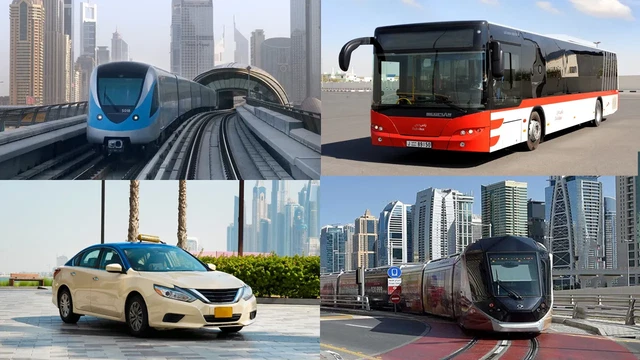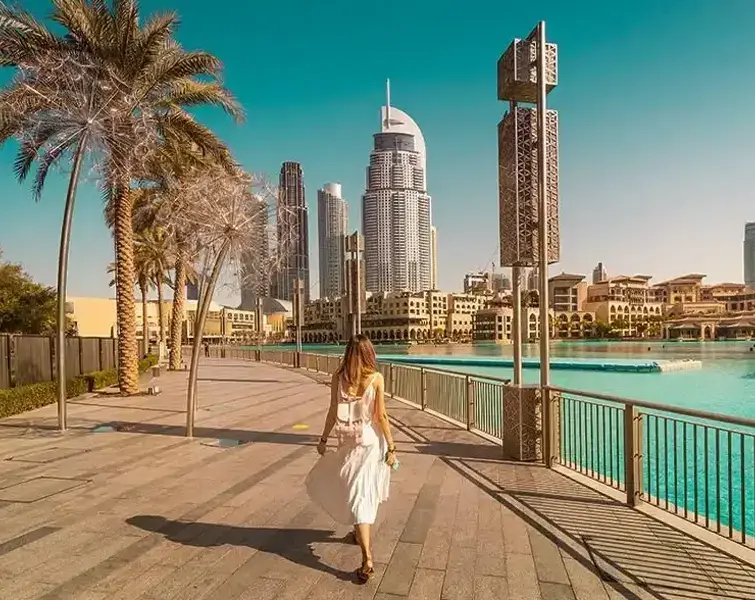Cost of Living in Dubai: A Complete Guide for Expats and Newcomers
At Dar Al Tharwa, we receive a lot of questions every day from people curious about living in Dubai. Today, we’re going to answer all your questions about the cost of living in this dynamic city.
Dubai has become a dream destination for many people around the world. Its attractive tax laws, modern lifestyle, and multicultural environment make it one of the most desirable places to live. Even some of the world’s biggest celebrities, like Cristiano Ronaldo, have praised Dubai many times. For example, at the Globe Soccer Awards held in Dubai, Ronaldo said:
“Dubai is one of the best cities in the world. I come here every year and enjoy being here.”
In another interview, he added:
“Dubai is one of my favorite cities; a safe, modern, and energetic place.”
But it’s interesting to know that Dubai wasn’t always this luxurious and developed. Just a few decades ago, it was mainly a desert with very few people living here. No one could have imagined that one day it would grow into such a global hub for business, tourism, and living.
Today, Dubai has become home to many multinational companies, especially in the investment and technology sectors. These companies have helped the city flourish and become a magnet for startups, entrepreneurs, and migrants looking for new opportunities.
One of Dubai’s main attractions is that it doesn’t have personal income tax, which means you get to keep almost all of your earnings. This tax-free environment attracts many people who want to build a better life with more financial freedom.
If you are considering moving to Dubai, it’s important to understand the costs involved in daily living. This includes rent, food, transportation, and other essentials. In this video, we will cover all these costs in detail to help you plan your budget realistically.
Housing is usually the biggest expense. Depending on where you choose to live—whether in more affordable neighborhoods or in upscale areas—the cost can vary a lot. For example, areas like Deira and Bur Dubai are popular among many migrant communities, including Iranians, Afghans, and Pakistanis, offering relatively affordable housing options. Meanwhile, neighborhoods like Dubai Sports City attract a younger, more international crowd.
Food expenses also depend on your lifestyle. Eating out in Dubai can be expensive if you prefer restaurants in luxury malls, but there are many affordable local markets and eateries as well.
Transportation is another important cost to consider. As a new resident, you might not be able to rent a car immediately, so public transport like the Dubai Metro is your best option. The metro is very efficient, with trains arriving every two minutes and connecting most parts of the city. However, taxis are expensive and usually start at a base fare of 25 AED.
Overall, living in Dubai offers many opportunities for both wealthy individuals and middle-class families. With careful budgeting and understanding of the costs, you can enjoy a comfortable and even luxurious lifestyle here.
In the following sections, we will dive deeper into each of these categories, we will be explain in the following.

Accommodation Costs and Dubai’s Neighborhoods
The first and most important expense every newcomer or migrant to Dubai faces is housing. Dubai is a large city with diverse neighborhoods, each having its own characteristics and communities.
Deira: One of Dubai’s older and more affordable areas, where many Iranian, Afghan, and Pakistani migrants live. Due to relatively lower rental prices, Deira is attractive for those looking for more budget-friendly living. Renting a one-bedroom apartment in Deira usually costs between 4,500 to 7,000 AED per month, while a two-bedroom apartment rents for around 7,000 to 12,000 AED.
Barsha and Jebel Ali: These areas are home to many Asian migrants, including Indians, Pakistanis, and Afghans. Barsha, being close to business centers and having moderate prices, is popular among residents. Rental costs in these neighborhoods are similar to Deira but tend to be a bit more upscale with better amenities.
Downtown Dubai and Marina: These are the luxury and modern areas of Dubai, mostly inhabited by Europeans, Americans, and some wealthy Indians and Middle Easterners. Rent here is usually higher, with one-bedroom apartments starting around 9,000 AED per month.
Dubai Sports City: A modern and sporty area in the southwest of Dubai, equipped with diverse sports facilities like a cricket stadium, golf courses, and gyms. This neighborhood appeals mostly to families and people seeking an active and healthy lifestyle. Many Indian, Pakistani, Afghan migrants, and international families live here. Renting a one-bedroom apartment ranges between 5,500 to 8,000 AED, and a two-bedroom between 8,000 to 13,000 AED.
Other neighborhoods: Areas like Palm Jumeirah and Dubai Hills are among the more expensive and luxurious neighborhoods, favored by those seeking a high-end lifestyle and exclusive amenities.
Buying property in Dubai is possible for migrants but requires significant capital. Property prices vary widely depending on the location and size. Generally, small apartments in mid-range areas may start from around 700,000 AED, while large houses and villas in luxury areas can cost several million AED.
A common question is whether renting or buying is better. If you’re new to Dubai and plan to stay only for a few years, renting is usually the more sensible and flexible option. However, if you have long-term plans and the necessary capital, buying property can be a good investment.

How much does transportation cost in Dubai?
If you’ve recently migrated or are planning to live in Dubai, this section will help you budget more realistically.
In this part of our Dubai living cost series, we cover public transportation, taxis, and even car rentals:
First of all, if you just got residency, legally you can’t rent a car yet — so you’ll have to rely on public transport for now.
But that’s not such a bad thing! Dubai has one of the most punctual and convenient public transport systems. The metro arrives every 2 to 4 minutes and covers most parts of the city.
If you use an NOL Card, your commuting costs will be much lower.
How about taxis?
Base taxi fares range from 12 to 25 AED (depending on the type of taxi and time). The final fare is calculated per kilometer.
If you rely solely on taxis, be prepared to spend a lot.
What about car rentals?It’s easier for tourists. But if you’re a resident and haven’t got a UAE driving license yet, you’re not allowed to rent a car.After getting your license, renting an economy car starts at around 1500 AED per month (excluding fuel and insurance).
Monthly transportation costs in Dubai (per person):
Lifestyle
Type of Transportation
Average Monthly Cost (AED)
Budget
Metro and bus only
250–350
Moderate
Mixed (metro + occasional taxi)
500–700
Comfortable/Luxury
Regular taxi use or car rental
1500–2500
📌 Conclusion?
In your first months, definitely rely on public transportation. It’s cheaper, faster, and covers the whole city.
art 4 – Entertainment in Dubai: For Every Taste and Budget
Dubai isn’t just a business or economic hub; it’s a city full of energy, entertainment, and unique experiences — for everyone, at every lifestyle level.
Whether you’ve just arrived in Dubai or have lived here for years, whether you want free entertainment or a special luxury experience, this city has something for you.
✅ Free or Low-Cost Activities: To relax, recharge, or just hang out
Al Fahidi Historical District
Stroll through traditional alleys, wind towers, museums, and feel old Dubai — free and fascinating.
Beaches like JBR, Kite Beach, La Mer
No entrance fee — you can enjoy the sea, exercise, or just relax.
Public parks like Zabeel and Creek Park
Perfect for picnics, cycling, or affordable food courts. Entrance fees between 5 to 10 AED.
Art galleries at Alserkal Avenue
For culture and art lovers — free entry.
Mid-Range Activities: Have a special experience with a reasonable budget
Bowling, ice skating, trampoline parks, cinemas
Costs vary between 50 to 90 AED depending on the location.
Abra boat ride in Dubai Creek or Deira
Just 1 AED! One of the most unique and cheapest urban experiences.
Mid-range restaurants in JLT or Karama
Meals for two around 80 to 150 AED. Wide variety from Indian and Lebanese to Iranian cuisine.
Special and Luxury Entertainment: If you want to treat yourself
Burj Khalifa – At The Top
From 160 AED. An unforgettable view.
Water parks Atlantis or Wild Wadi
Around 250–350 AED for a thrilling day.
Desert safari with dinner, camel riding, and fire shows
Authentic desert experience from 150 AED up to 500 AED packages.
Ski Dubai (skiing in the desert!)
Entry from about 220 AED and up.
Special Tip for Everyone
With apps like:
🔸 The Entertainer
🔸 Groupon UAE
🔸 Cobone
You can find buy-one-get-one-free deals or great packages.
Even with a limited budget, you can plan a fun-filled week.
Healthcare Costs in Dubai“Getting sick is never pleasant — especially when you’re a migrant living in a new country like Dubai. Here’s a simple guide on how much you should set aside for common illnesses or a simple dental visit. Straightforward, no complications.”

Healthcare Costs in Dubai
One of the biggest concerns after migrating is the cost of healthcare and medical services in the new country. Dubai offers a good healthcare system, but if you don’t have insurance, the expenses can become quite heavy. Here’s a clear overview of what you really need to know:
Health Insurance: Your Safety Net
In Dubai, having health insurance is mandatory for everyone.
- If you’ve moved here for work, your employer is responsible for providing you with insurance.
- If you hold a personal residence visa, you must purchase insurance yourself.
Basic annual insurance cost:
Ranges between 500 to 1000 AED, which covers essential medical services.
How much should you budget for common illnesses?
For example, if you catch a cold or need to see a general practitioner:
Type of Service
Average Cost (without insurance)
General practitioner visit
80 to 150 AED
Common medications (antibiotics, allergy meds, fever reducers)
30 to 60 AED
Basic lab tests or X-rays
150 to 300 AED
With insurance, these costs can be reduced by up to 80%.
Suggested monthly budget for common illnesses: 200 to 300 AED.
What about dental care in Dubai?
Dental costs are often not fully covered by most insurance plans, so it’s wise to set aside a separate budget for dental care:
Service
Average Cost
Simple teeth cleaning
250 to 400 AED
Filling a cavity
300 to 600 AED
Root canal treatment or crown
1000 AED and up
📌 Suggested annual dental budget: Around 1500 to 2000 AED if you don’t have any major issues.
🟢 Summary for new migrants:
Item
Recommended Monthly Savings
Insurance + common illnesses
200 to 300 AED
Dental (if needed)
Average 150 to 200 AED monthly (or a higher one-time annual cost)





